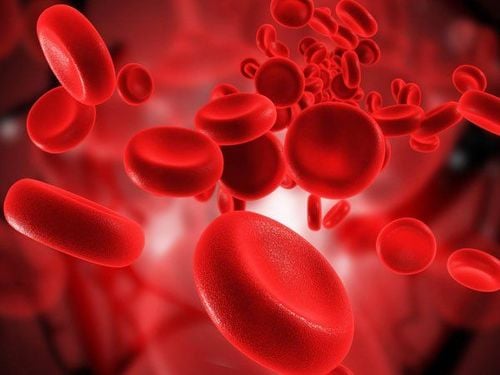This is an automatically translated article.
Pregnant women are one of the subjects at high risk of anemia. This can have many different causes, with the majority being related to a diet lacking in essential nutrients like vitamin C, folate and iron. Anemia in pregnancy, if not corrected early, can seriously affect the health of both mother and baby.
1. Types of anemia during pregnancy
Anemia during pregnancy is a common problem in pregnant women. When you have anemia, your body will be deprived of healthy red blood cells to carry oxygen throughout the tissues and to the fetus in the abdomen.
During pregnancy, your body will need to produce more blood to support the development of the fetus. If you don't get enough iron or some other nutrient, your body won't be able to produce enough of the red blood cells it needs to make the blood that nourishes your baby.
Mild anemia during pregnancy is not a cause for concern. However, your anemia may be aggravated by low levels of iron or vitamins in your body.
Anemia can make you feel tired and weak. If anemia is severe without prompt treatment, it can increase your risk of serious complications like premature birth. Here are some types of anemia that can develop during pregnancy, including:
Iron deficiency anemia Folate deficiency anemia Vitamin B12 deficiency anemia MORE: Anemia during pregnancy what to eat and drink ?

Tình trạng thiếu máu khi mang thai gây ảnh hưởng đến sức khỏe mẹ bầu và thai nhi
2. Causes of developing various types of anemia during pregnancy
Here are some causes of anemia during pregnancy, including:
2.1. Iron deficiency anemia
This type of anemia usually occurs because the body does not have enough iron to produce the necessary amount of hemoglobin. This is a protein found in red blood cells that helps carry oxygen from the lungs to the rest of the body. When you have iron-deficiency anemia, your blood will not be able to carry enough oxygen to your body's tissues. Overall, iron deficiency is the most common cause of anemia in pregnancy.
MORE: Iron deficiency anemia during pregnancy: Prevention tips
2.2. Folate deficiency anemia
Folate is a vitamin found naturally in some green vegetables. Normally, our bodies need folate to produce new cells, including healthy red blood cells. Therefore, pregnant women are often advised to take regular folate supplements. When the body does not get enough folate, it leads to a shortage of red blood cells to carry oxygen throughout the tissues. In addition, folate deficiency also directly contributes to some forms of birth defects, such as low birth weight and spina bifida.
2.3. Vitamin B12 deficiency
Our body needs this vitamin to form healthy red blood cells. When pregnant women don't get enough vitamin B12 from their diet, their bodies won't be able to produce enough red blood cells it needs. The risk of vitamin B12 deficiency tends to be higher in women who do not eat meat, poultry, eggs and dairy products. This can lead to birth defects in the unborn baby, such as neural tube defects or premature birth.

Thiếu vitamin B12 có thể khiến thai nhi bị dị tật bẩm sinh
3. Some risk factors for anemia in pregnancy
Most pregnant women are at risk of anemia. This is because they need more iron and folic acid than usual. However, the risk of anemia is higher for some of the following:
Pregnancy multiple times Having two pregnancies close together Not eating enough iron-rich foods Teenage pregnancy Teenager Anemia before pregnancy
4. Common symptoms of anemia during pregnancy
Here are some of the most common symptoms of anemia during pregnancy, including:
Feeling weak and tired Pale skin, lips and nails Shortness of breath Dizziness Dizziness Heart palpitations Difficulty concentrating In the early stages of anemia, symptoms may not be apparent. Ideally, pregnant women should visit a doctor or have regular blood tests to check their health before giving birth.

Thiếu máu khi mang thai sẽ khiến mẹ bầu chóng mặt
5. Nutrition helps improve anemia during pregnancy
To be able to manage the symptoms caused by anemia during pregnancy, pregnant women should actively build a diet that fully meets their nutritional and energy needs. In addition, pregnant women should also take folic acid and iron supplements and control conditions such as malaria or intestinal parasites.
You can prevent anemia during pregnancy through an adequate supply of iron. Accordingly, you should eat at least 3 servings per day of iron-rich foods, such as:
Poultry, lean red meat and fish Egg yolks Liver Beef Grains Dark green leafy vegetables, for example like broccoli, kale and spinach Beans, tofu and lentils Seeds and nuts In particular, eggs are a rich source of many nutrients, including calcium, protein, iron, and phosphorus. Phosphorus, vitamins and minerals are beneficial for the health of both mother and baby during pregnancy. Therefore, pregnant women should try to eat about 3-4 eggs per week to provide adequate nutrients for the body.
In addition to adding iron in your diet, you should also increase your consumption of foods rich in vitamins to prevent anemia during pregnancy. Here are some rich sources of vitamin C that you should choose, including: Strawberries, citrus fruits, tomatoes, kiwi fruit, bell peppers, dragon fruit, apples, grapefruit...
Party Besides, you should eat a combination of iron-rich foods with foods that provide a lot of vitamin C. For example, you can eat iron-fortified cereal with a glass of orange juice for breakfast. In addition, you should also choose foods rich in folate to prevent folate deficiency anemia during pregnancy. Foods high in folate typically include: green vegetables, citrus fruits or juices, folic acid fortified breads and cereals, and dried beans.
Pregnant women should limit their consumption of substances that can interfere with the absorption of iron into the body, such as phytates or tannins commonly found in teas and raw cereals. In addition, pregnant women should not take iron pills with calcium or anti-ulcer drugs because this can reduce the body's ability to absorb iron. In case it is necessary to take these medicines at the same time, you should take them at least 2 hours apart. Note, iron-containing medicines should not be taken with coffee, tea or milk, as this combination also contributes to iron absorption.
SEE ALSO: What medicine should an anemic pregnant woman take?

Thịt bò là một thực phẩm giàu chất sắt
6. Some notes when supplementing iron - folic acid tablets for pregnant women
During pregnancy until delivery after one month, you should take one iron - folic acid tablet every day, equivalent to 600 mg of iron and 400 mcg of folic acid. For pregnant women with anemia, it is necessary to use supplements according to the doctor's prescription.
In certain cases, taking iron - folic acid tablets can cause some unwanted side effects, such as nausea or constipation. However, these symptoms are usually not a health concern and may go away on their own after a few weeks. To reduce the unpleasant effects of drugs, you should take them at a certain time of day, and try to eat a lot of vegetables and drink enough water.
Pregnancy always faces the risk of anemia, affecting the health of both mother and fetus. Accordingly, the preparation of good antenatal knowledge, good physical preparation during pregnancy, nutritional supplements in combination with daily iron tablets are necessary to reduce the risk of anemia during pregnancy and "round mother, square child".
Vinmec International General Hospital is the address chosen by many families during pregnancy. In particular, when pregnant women choose the Package Maternity Care Program right from the beginning of their pregnancy from the first months of pregnancy, they will be able to fully participate in antenatal check-ups, periodical 3D and 4D ultrasounds, and other health care providers. routine tests to ensure that the mother is healthy and the fetus is developing comprehensively.
Pregnant women will be consulted and examined for health, advice on pregnancy nutrition under the close supervision of experienced and specialized obstetricians, helping mothers gain more knowledge to protect health during pregnancy as well as minimize complications affecting mother and child.
Please dial HOTLINE for more information or register for an appointment HERE. Download MyVinmec app to make appointments faster and to manage your bookings easily.
Reference source: webmd.com













